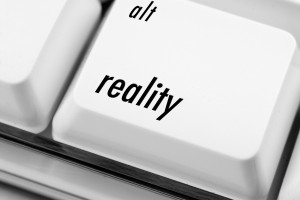How You Create Your “Reality”
Today’s Post Is Excerpted From “The UnifiedMind Classroom”
You Say “Tow-may-tow” and I Say “Toe-ma-toe”
 Our neurological and physiological processes, both Conscious and Unconscious, and our interpretations of external stimuli by way of our five senses (sight, hearing, smell, taste, touch and feelings) create our individual and personal meanings of the world around us.
Our neurological and physiological processes, both Conscious and Unconscious, and our interpretations of external stimuli by way of our five senses (sight, hearing, smell, taste, touch and feelings) create our individual and personal meanings of the world around us.
The transformations that take place within a human being in order to understand and process information become the basis of each individual’s unique subjective experience of our consensual reality.
Filters play a critical role in how these transformations take place.
Filters are unconscious and/or neurological factors that constrain or influence the availability, quantity and quality of information coming to us from the outside world. Filters structure our interpretation of the outside world and shape our subjective reality (our values, identity and beliefs).
 These filters can be a combination of biological, neurological, psychological, physiological, and socially biased constraints.
These filters can be a combination of biological, neurological, psychological, physiological, and socially biased constraints.
As an example: collectively, humans can only perceive a small spectrum of available light; individually, a particular individual may be color-blind, unable to see all the colors available to human beings in general. Additionally, certain cultures have fewer words (distinctions) for classes of colors, while others have many.
The three filters that shape our subjective reality are deletion, distortion and generalization.
Deletion is the process of selectively paying attention to some portions of experience, while excluding others – in part or in total.
For instance: as you are reading this, not being consciously aware of the temperature of your feet, the movement of your eyes across the page, or otherwise directing your attention away from distractions while reading.
Distortion is an unconscious process wherein an individual filters and massages data coming to them from the outside based on their subjective ‘deeper meaning’. Using this deeper meaning enables us to distort reality or to distort our interpretation of reality.
We distort reality when we imagine things that do not exist (things that defy the natural order) or by drawing conclusions about existing information and projecting our conclusions forward in time (things that do not exist yet, such as a future event).
 An example of our ability to create things that defy the natural order is demonstrated in our ability to picture a pink elephant, even though never having seen one in real life.
An example of our ability to create things that defy the natural order is demonstrated in our ability to picture a pink elephant, even though never having seen one in real life.
We distort our interpretation of reality when we filter information on the basis of our personal bias and/or conclusions and then project them upon reality. An example of a distorted interpretation is that of an insecure individual, who upon entering a room where people immediately look at him, jumps to the conclusion that they were talking about him.
Generalization is the process where an individual’s initial encounter with a particular experience – their prior perceptions, interpretations and learnings – forms a blueprint.
This blueprint then acts as a guide against which other similar experiences – or an entire category or class of experience – can be compared.
We immediately form a conclusion, “this is like that.” In the absence of prior experience, generalization also enables us to fill in the gaps.
An example of generalizing experiences is, “I can tie the laces on this blue shoe, I can tie the laces on that red shoe, I can tie the laces on all shoes, I can tie the ribbon on this bonnet, even though I’ve never done this before.”
Our consensual reality is our shared reality, the world outside ourselves. Because we all have access to this consensual reality, we believe and act as if we are all experiencing reality the same way. In so doing, we often over-estimate the degree to which we actually do experience the same thing.
Indeed there are things that we can agree on. A snake is a snake no matter who perceives it. However, one person’s subjective reality regarding snakes may cause them to fear snakes (perhaps even to the point of a phobic reaction when in the presence of one).
This subjective reality (personal model) and corresponding response is quite unlike someone who is fascinated with snakes and studies them for a living.
Stated in a more personally relevant way, consider the puzzling experience of having members of your family recall a different version of a shared event.
Though the event was the same, the interpretation of that event by each individual is unique to them. Because we share an experience, we often expect consensus in our interpretations. However, we are often frustrated to discover that the real story (ours) is often dismissed or rejected.
If we could truly inhabit another person’s mind for a day, it would be a very different and strange world from our own.


